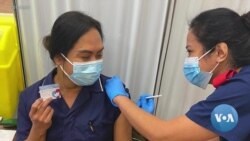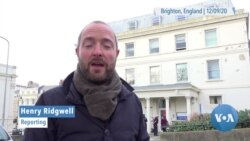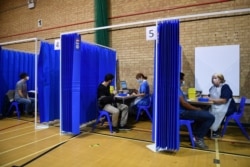Scientists and doctors say the mass coronavirus vaccination campaign that started in Britain this week represents a major milestone in the fight against COVID-19, although big challenges remain in producing and distributing enough vaccines to end the global pandemic.
Britain was the first country in the world to start coronavirus vaccinations after regulators approved the Pfizer-BioNtech vaccine last week.
Filipino nurse Leo Quijano, who works at the Royal Sussex County Hospital in the southern city of Brighton, received the vaccine Wednesday. She told VOA she has full confidence in it.
“I feel more confident and safe, because I’ve been COVID positive before and I was admitted in the hospital. There are thorough studies and research before the vaccine comes out. So, I feel positive about it,” Quijano said.
Colleague Ashley Lecheminint works in the hospital’s catering department and also received the vaccine Wednesday. “We’re going to defeat this coronavirus now,” Lecheminint said. “It’s going to be like a new beginning.”
Many of those taking the vaccine are elderly or clinically vulnerable and have been self-isolating for several months. In the fifty vaccination clinics across Britain, there were emotional scenes among staff and patients as the first injections were administered Tuesday. Among those receiving the vaccine was World War II veteran Michael Tibbs, who is 99 years old.
“I'm very lucky, really,” Tibbs told reporters at the hospital near his home in Portsmouth. “I hope that everybody will afford it and have it, because it's really no problem at all. And I think I'm very fortunate.”
Britain’s Health Secretary Matt Hancock wiped away tears as he was interviewed on television Tuesday. “After this year, which has been so terrible for so many people, and the sacrifices people have made, and the losses that we’ve all suffered. To have this moment showing the way out is just absolutely fantastic,” Hancock told ITV’s Good Morning Britain program.
However, Britain’s Chief Medical Officer Chris Witty voiced a note of caution Wednesday.
“I want to be very clear; for the next three months we will not have sufficient protection. We're going through the most difficult time of year for respiratory infections,” Witty told a parliamentary committee.
Two health care workers suffered allergic reactions to the injection Wednesday. Doctors said they both had a history of allergies and this wasn’t unusual.
Britain says ‘no corners were cut’ in approving the safety of the vaccine, and that it is 95% effective in stopping COVID-19 illness. It is hoped four million doses will be given out before the end of the year. First in line are people over 80 years old, health workers and nursing home staff.
It’s not yet known if the vaccine only prevents illness from COVID-19 or if it will also prevent transmission of the virus.
Across Britain hospitals are still admitting thousands of patients with COVID-19 – and hundreds are still dying every day. There are fears that public adherence to social distancing and lockdown rules may fall as the vaccination program begins.
The government also faces a challenge convincing some people to take the vaccine. Recent polls suggest half of Britons have safety fears and one in three may refuse it altogether.
Back in Brighton, nurse Leo Quijano told VOA she feels lucky to get the vaccine compared to those back in her home country of the Philippines.
“Sometimes it’s only the privileged people who can have the vaccine back home – if you’ve got money, they can pay for it, or if the government will provide for it, you know, we don’t know really. That’s why we’re hoping that it’s going to be accessible to everyone.”
It’s hoped other promising vaccines will also soon be approved. Britain is off to a head start, and the government says it hopes life could be back to normal by the spring.








